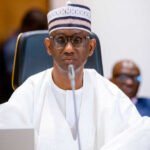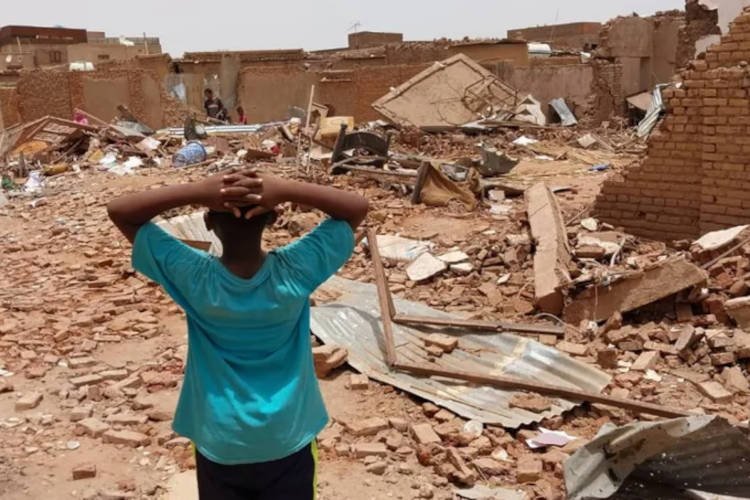In 2023, we continued to champion issues often overlooked and push for social change across Africa.
From the west to the east and the north to the south of the continent, we focused on the impacts of policies and actions on citizens and communities and linked key advocacy messages to our stories while providing our diverse audience with well-thought-out calls to action.
Below is a roundup of some of our major stories from the year.
1. How Buhari, Emefiele Hit Nigerians with ‘Sapa’
In the first quarter of 2023, millions of Nigerians faced unprecedented hardship due to the failed naira redesign policy of the Central Bank of Nigeria (CBN). We called on the then President, Muhammadu Buhari, who approved the CBN policy, to take responsibility for its failure and apologise to Nigerians for the avoidable hardship they were facing.
We also demanded the immediate resignation of the CBN Governor at the time, Godwin Emefiele, and urged that going forward, such a policy should be properly thought through and all stakeholders carried along from the formulation stage. Read more
2. ‘Arrival’ of Nigeria Air Plane
A video showing a plane with the ‘Nigeria Air’ inscription on it trended on social media on the last working day of the President Muhammadu Buhari administration. Nigeria’s Minister of Aviation at the time, Hadi Sirika, also posted the video of the plane on his official Twitter page.
However, to date, the plane is nowhere to be found in Nigeria, and the federal lawmakers in the country declared the project a fraud. We called on the relevant law enforcement agencies in Nigeria, including the Economic and Financial Crimes Commission (EFCC), to begin investigations into the whereabouts of the alleged N85 billion spent on the failed Nigeria Air project. Read more
3. South Africa: 26,515 Teenagers Pregnant in Eight Months
We gathered from the KwaZulu-Natal in South Africa that it had recorded 26,515 pregnancies of young girls aged between ten and 19 in eight months, and called on the country’s National Prosecuting Authority (NPA) and the police to ensure the proper enforcement of the Criminal Law (Sexual Offences and Related Matters) Amendment Act 32 of 2007. Read more
4. Five Lessons from Mmesoma’s UTME Result Saga
We highlighted what education stakeholders in Nigeria must consider as the Joint Admissions and Matriculation Board (JAMB) discovered that a candidate forged her 2023 Unified Tertiary Matriculation Examination (UTME) result. Read more
5. ’40 Million Lives at Risk in East Africa’
Due to famine and hunger in East Africa, we called for the renewal of the United Nations-brokered Black Seas Grain deal, which was set to expire on 18 March, as more than 40 million people remained at risk in the region. Read more
6. Plateau Killings: A Failure of Intelligence Gathering
The Nigerian intelligence agencies failed in their primary duty of protecting citizens from internal threats as over 100 citizens were killed in Plateau State. We called for the strengthening of all of Nigeria’s intelligence agencies to be more effective in detecting and preventing attacks. We also called on the president to fulfil his promise to establish a specialised anti-terrorist squad to protect communities from terrorists, kidnappers, and bandits. Read more
7. What Offence Have Rights Activists Committed in Malawi?
The government of Malawi terminated its partnership with Inua Advocacy, an independent civil society organisation (CSO) that advocates for refugee rights in the country and beyond. We demanded that the government of Malawi fulfills its international obligations to respect refugee rights, improve their living conditions, and not obstruct the important work of civil society groups defending these rights. Read more
8. N187bn Fraud: Humanitarian Ministry Not Transparent; What Edu Must Do
Nigeria’s Economic and Financial Crimes Commission (EFCC) said it uncovered N37 billion allegedly laundered in the country’s Ministry of Humanitarian Affairs and Poverty Alleviation under former Minister Sadiya Umar-Farouk. We advised the current minister, Betta Edu, to establish clear guidelines, conduct regular audits, and openly report on the ministry’s activities to deter and detect corruption in the ministry and earn the trust of Nigerians. Read more
9. Concerns over Cyclone Freddy
Cyclone Freddy hit the southern region of Malawi on 12 March, 2023, with heavy rains and strong winds causing damage to infrastructure such as roads, buildings and electricity lines. Development Diaries called on Malawi’s Department of Disaster Management Affairs to ensure the implementation of disaster risk management programmes to safeguard the lives of citizens affected by the disaster.
We also demanded an urgent response from the Africa Adaptation Acceleration Programme (AAAP), which is a joint initiative of the AfDB and the Global Centre on Adaptation (GCA) to support Africa’s low-income countries impacted by climate change. Read more
10. Libya: Concerns Raised over Human Rights Situation
In March, the United Nations Fact-Finding Mission warned that urgent action was needed to remedy the deteriorating human rights situation in Libya. We called on the Libyan authorities to respect the various international human rights laws to which it is a signatory, like the International Covenant on Economic, Social and Cultural Rights (ICESCR), which it ratified in 1976, and the International Covenant on Civil and Political Rights (ICCPR), which it ratified in 1976. Read more
11. How Bandits’ Attacks in Kagara Force Students out of School
It has been two years since the attack on Government Science College in Kagara, Niger State, but many residents and indigenes of the town still live in fear. A check by Development Diaries revealed that only schools located along roadsides are open, as many public schools have since been shut down due to persistent attacks by bandits.
Musa Nasir, a resident and teacher at Women Day College, which is along the Kaduna-Birnin Gwari-Kagara Road, told Development Diaries that many parents withdraw their children from school as a result of banditry.
‘Some parents withdraw their children, particularly the girls, but it is a lack of confidence in the government and the system’, he said.
‘Some of them [girls] got married because of insecurity. Before the attack [the raid on Government Science College in February 2021] this school [Women Day College] had more than 1,000 students. Now, SS3 has only 13 students’, he said.
We called on the Nigerian government to address this challenge by immediately rolling out the implementation of the Safe Schools Plan of Action and the National Policy on Safety, Security and Violence Free Schools. Read more
12. On Electoral Offenders and INEC, Police Task
In late March, the police in Nasarawa State, north-central Nigeria, announced a ban on all forms of protest across the state ‘to forestall a breakdown of law and order’. However, the ban was illegal as it was a violation of the fundamental human right to peaceful assembly and association. We, therefore, called on the Nasarawa State government and the state’s police command to retract this ban and allow people the freedom to express their rights to protest peacefully. Read more
13. Arrest of Election Offenders in Nigeria
The Nigerian police announced in March that they had arrested 781 alleged electoral offenders during the 2023 general election. However, the Inspector General of Police (IGP) failed to disclose the exact electoral offences that were committed. We therefore called on the police to explicitly state the electoral offences committed according to sections 125–128 of the Electoral Act 2022 We also urged INEC to work in tandem with the police and abide by the provisions of the law in providing punishment for electoral offenders. Read more
14. Balogun Market and ‘Mysterious’ Fire
Many traders counted their losses following a fire outbreak at the popular Balogun Market in Lagos State, southwest Nigeria. One complaint put out by some of the victims was that when the fire response team came around, they could not access the buildings on fire because the makeshift shops could not allow them to drive through.
We called on the Caretaker Management Committee of the market to look into the issues raised and find ways to educate traders on safety precautions. We also called on the committee to commence a proper investigation into the cause of the fire incident to forestall a repeat. Read more
15. Libya: Crackdown on CSOs Reported
Human Rights Watch (HRW) reported that Libya‘s Government of National Unity (GNU) and other authorities were cracking down on civil society organisations (CSOs). The GNI, in a March 2023 circular, said that domestic and foreign NGOs could continue operating only if they ‘correct their legal status’ in line with a 2001 Muammar Gaddafi-era law. We called on the Libyan authorities to stop the hostile campaign against Libyans exercising and defending their human rights. Read more
16. On Lai Mohammed’s ‘Transparent’ Election Claim
In April, Nigeria’s Minister of Information, Lai Mohammed, said that the 2023 elections were the freest and most authentic it had ever conducted. However, many election observers, including Development Diaries, condemned the polls over widespread violence and electoral irregularities that accompanied the process. Read more
17. Why Africa Should Encourage Girls in ICT
As African countries joined the rest of the world to commemorate 2023 Girls in ICT Day, we urged governments to put in place strategies to leverage the economic empowerment of women and girls through ICT adoption and favourable ICT policies, culture, ethics, and values. Read more
18. South Africa: Torture Persists Despite Law
In South Africa, torture happens in police cells, correctional services, other places of detention, on the streets, and in some cases, in people’s private spaces despite the country’s Prevention and Combating of Torture of Persons Act 13 of 2013. We called on the Independent Police Investigative Directorate (IPID), the Judicial Inspectorate of Correctional Services (JICS) and the South African Human Rights Commission (SAHRC) to take further actions in monitoring, investigating, and preventing torture in the country. Read more
19. Egypt: Woman Arrested for Reporting ‘Torturing’ of Husband
Cairo Institute for Human Rights Studies (CIHRS) reported that the authorities in Egypt were allegedly beating and torturing Mohamed el-Baqer, a human rights lawyer. CIHRS reported the matter in a tweet following the arrest of el-Baqer’s wife, Nematallah Hisham. We called on the Egyptian authorities to immediately release Hisham and adhere to international human rights agreements, including the Convention against Torture and Other Cruel, Inhuman, or Degrading Treatment or Punishment, to which the country is a party. Read more
20. 98 Chibok Schoolgirls Still in Captivity
It has been nine years since 276 schoolgirls were abducted from their dormitory in Government Girls Secondary School, Chibok, Borno State, Nigeria, by Boko Haram terrorists. Since the Chibok abduction, 96 girls remain in captivity, and insecurity has continued to keep children away from schools in parts of Nigeria. We demanded that the Nigerian government implement the National Policy on Safety, Security, and Violence-Free Schools. Read more
21. Abuse of Illegal Immigrants in DRC
The United Nations reported rape and other types of violence against women and children in the Democratic Republic of the Congo (DRC) following their expulsion from Angola. We called on the Angolan government to stop the abusive deportation of migrants from Congo and conduct a prompt and impartial investigation into alleged abuses by state security forces. Read more
22. Rights of Children Still Violated in Nigeria
As Nigeria marked another Children’s Day on 27 May, the country remained one of the most difficult places to be a child. The rights of children are violated daily and almost with impunity, figures from the Organisation for World Peace show. We called on states in the country that had yet to sign the child rights bill into law, including Bauchi, Gombe, and Kano, to immediately do so. Read more
23. Cameroon: 30 Abducted Women ‘Severely Tortured’?
We condemned the kidnapping of 30 women by pro-independence rebels in western Cameroon, and called on the country to protect communities at risk and prosecute those responsible for abuses. Read more
24. Minister: I Didn’t Know Anything about Education
Nigeria’s Minister of Education, Adamu Adamu, admitted in May that he knew nothing about the sector when he was appointed by President Muhammadu Buhari. The minister had earlier admitted his failure to reduce the number of out-of-school children in Nigeria, despite the issue being one of his key priorities for over seven years. We called on incoming President Bola Tinubu to ensure that he prioritised competence in the appointment of ministers. Read more
25. Horror as Policemen Drive SUV over Cuffed Man
A disturbing video of some officers of the Nigeria Police Force (NPF) running over a handcuffed man with a Sienna vehicle in Ekpoma, Edo State, went viral online. The man in the video clip was handcuffed by some police officers attached to the Ekpoma division over his refusal to allow them to go through his mobile phones. Development Diaries called on the Commissioner of Police in Edo State, Adamu Dankwara, to immediately ensure that the erring officers were arrested and prosecuted accordingly to serve as a deterrent to others. Read more

26. PWDs Still Face Unjustifiable Discrimination in Nigeria
In June, Development Diaries observed the continued unjustifiable discrimination against people with disabilities in Nigeria and called on President Bola Tinubu and all state governors to make the inclusion and participation of citizens with disabilities in governance and development programmes a priority. Read more
27. Concerns Raised over Rights Repression in Eswatini
Human Rights Watch (HRW) reported the government of Eswatini‘s failure to ensure accountability for the crackdown on pro-democracy protesters by security forces that began two years ago. The crackdown led to the killing of at least 46 people, as well as other serious human rights abuses. We demanded the government’s review of the 1973 decree to allow for free political participation. Read more







